Varicose veins affect more than 30% of adults worldwide, with women being nearly twice as likely to develop them compared to men. These swollen, twisted veins often appear in the legs and can cause discomfort, heaviness, or even pain. While genetics, lifestyle, and age play key roles in their development, diet is an often-overlooked factor in managing vein health.
Here’s something surprising: a humble cucumber, often seen only as a salad filler or refreshing snack, may actually help support vascular health. Packed with water, antioxidants, and specific nutrients that promote circulation, cucumbers have been quietly praised in traditional wellness practices for their role in soothing and strengthening veins.
In this article, you’ll uncover why cucumbers may be more than just a hydrating vegetable. We’ll explore how their unique nutrient profile connects to vein health, practical ways to use them, and why incorporating cucumbers into your diet could support those dealing with varicose veins.
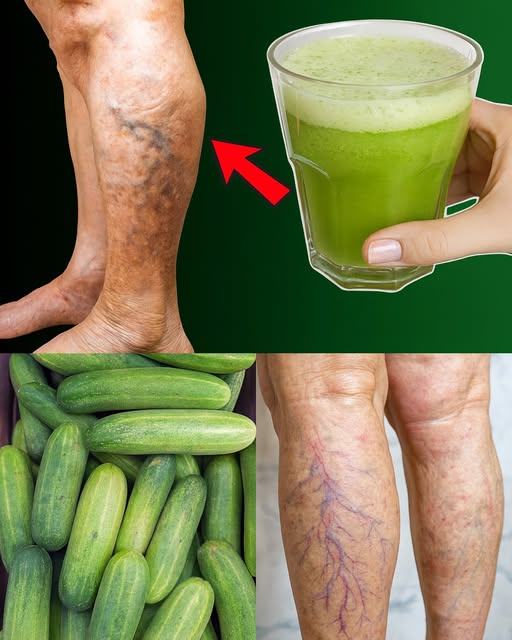
Why Cucumbers Are a Hidden Ally for Vein Health
Cucumbers are made up of about 95% water, making them one of the most hydrating foods available. But beyond hydration, they offer a surprising combination of vitamins, minerals, and antioxidants that directly or indirectly support circulation and vascular strength.
Key Nutrients in Cucumbers
- Vitamin C: Supports collagen production, vital for strong blood vessel walls.
- Vitamin K: Essential for proper blood clotting and vein elasticity.
- Silica: A trace mineral linked to connective tissue health.
- Potassium: Helps balance fluid retention, easing pressure on leg veins.
- Antioxidants (flavonoids and tannins): Combat oxidative stress that weakens veins.
| Nutrient | Role in Vein Health |
|---|---|
| Vitamin C | Supports collagen, strengthens vein walls |
| Vitamin K | Improves elasticity, aids circulation |
| Potassium | Reduces water retention and swelling |
| Silica | Helps connective tissue repair |
| Antioxidants | Protect veins from oxidative damage |
This nutrient synergy makes cucumbers uniquely suited to complement a lifestyle focused on vein wellness.
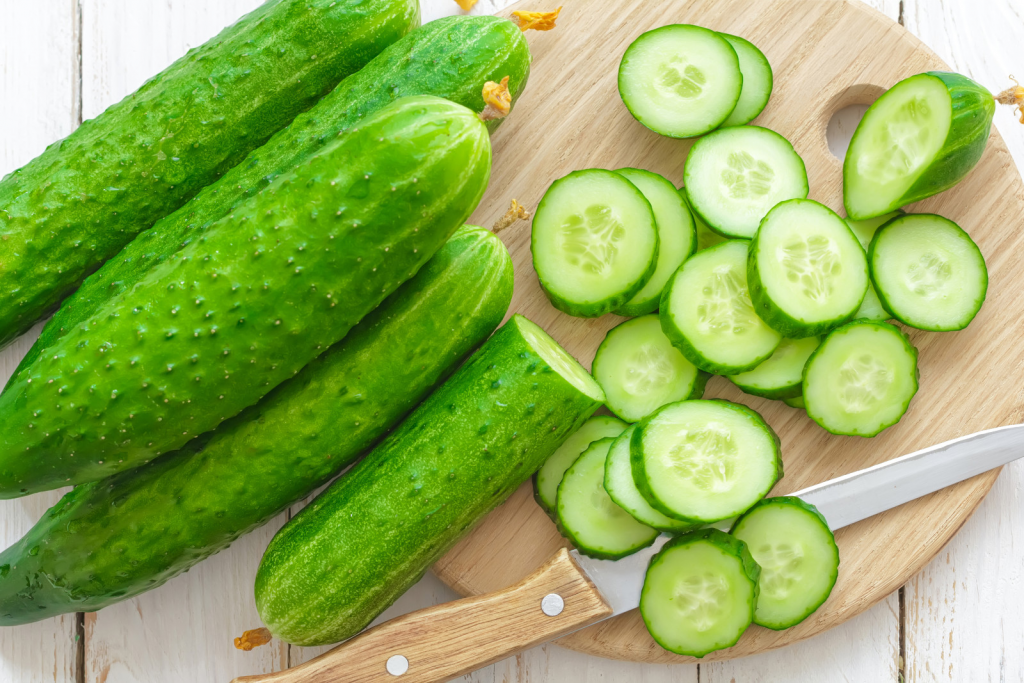
How Cucumbers May Help with Varicose Veins
Hydration and Circulation
Dehydration can make blood thicker and circulation slower, worsening varicose veins. Cucumbers’ high water content promotes better blood flow and helps prevent fluid buildup in the legs.
Collagen and Connective Tissue Support
Vitamin C and silica in cucumbers contribute to the production and maintenance of collagen, the protein that gives veins their structure. Stronger connective tissue means less bulging and weakening of vein walls.
Anti-Inflammatory Benefits
Cucumber antioxidants may help reduce inflammation around swollen veins. Cooling cucumber slices are often applied topically for puffy eyes, and a similar soothing effect may apply when eaten regularly for vein health.
Fluid Balance and Swelling
Potassium-rich cucumbers counteract sodium, helping reduce fluid retention and swelling in the legs—two common issues linked with varicose veins.
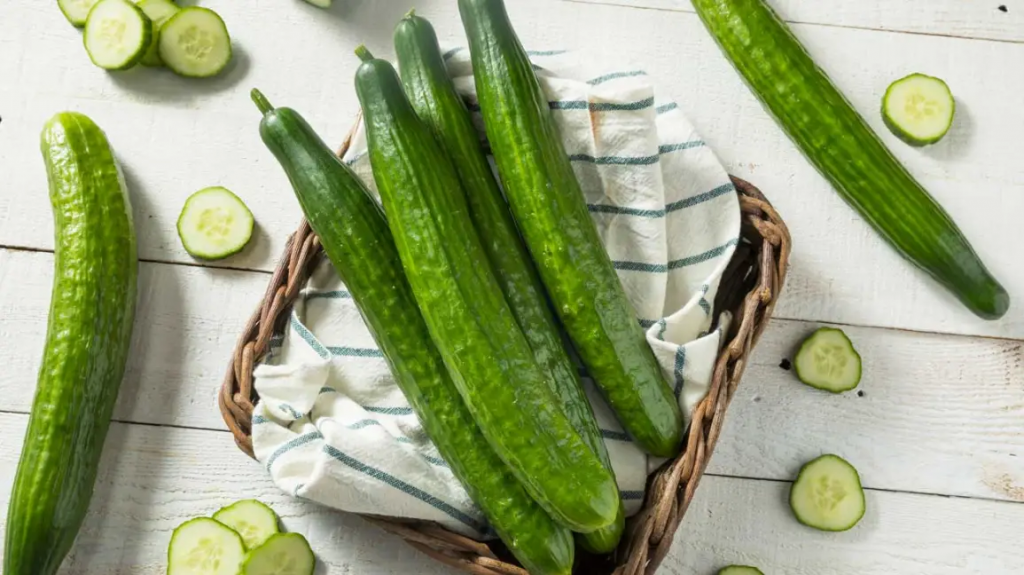
Practical Ways to Use Cucumbers for Vein Health
In Your Diet
- Raw salads: Combine cucumbers with leafy greens, tomatoes, and lemon juice for a circulation-friendly meal.
- Infused water: Add cucumber slices to water for refreshing hydration throughout the day.
- Smoothies: Blend cucumber with spinach, banana, and ginger for a nutrient-packed drink.
- Soups: Cold cucumber soup with yogurt or kefir makes a light, vein-friendly meal.
Topical Use
While eating cucumbers is the most beneficial for vein health, some people apply cucumber slices or juice directly on legs to provide temporary cooling relief from swelling or heaviness.
Lifestyle Tip
Pair cucumber intake with other vein-supportive habits: regular walking, elevating legs, and avoiding prolonged sitting.
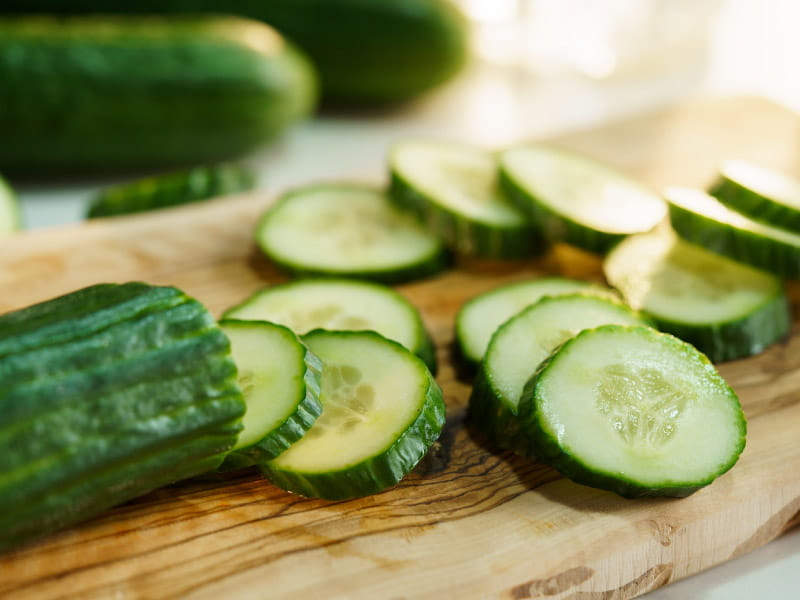
Case Study: A Simple Change with Noticeable Results
A 48-year-old office worker who spent hours sitting each day reported frequent swelling and discomfort in her legs. On her doctor’s suggestion, she added two cucumbers daily to her lunch routine—sometimes in salads, other times in smoothies. After six weeks, she noticed reduced swelling and a lighter feeling in her legs. While not a medical cure, this small change contributed to improved daily comfort and energy.
Additional Foods That Pair Well with Cucumbers for Vein Health
Cucumbers work even better when combined with other circulation-friendly foods.
- Citrus fruits: Extra vitamin C for collagen support.
- Leafy greens: High in vitamin K for vein elasticity.
- Berries: Rich in antioxidants to fight inflammation.
- Nuts and seeds: Provide magnesium and healthy fats for circulation.
| Food Group | Key Nutrient | Benefit for Veins |
|---|---|---|
| Citrus fruits | Vitamin C | Collagen synthesis |
| Leafy greens | Vitamin K | Vascular elasticity |
| Berries | Flavonoids | Anti-inflammatory |
| Nuts & seeds | Magnesium | Circulation support |
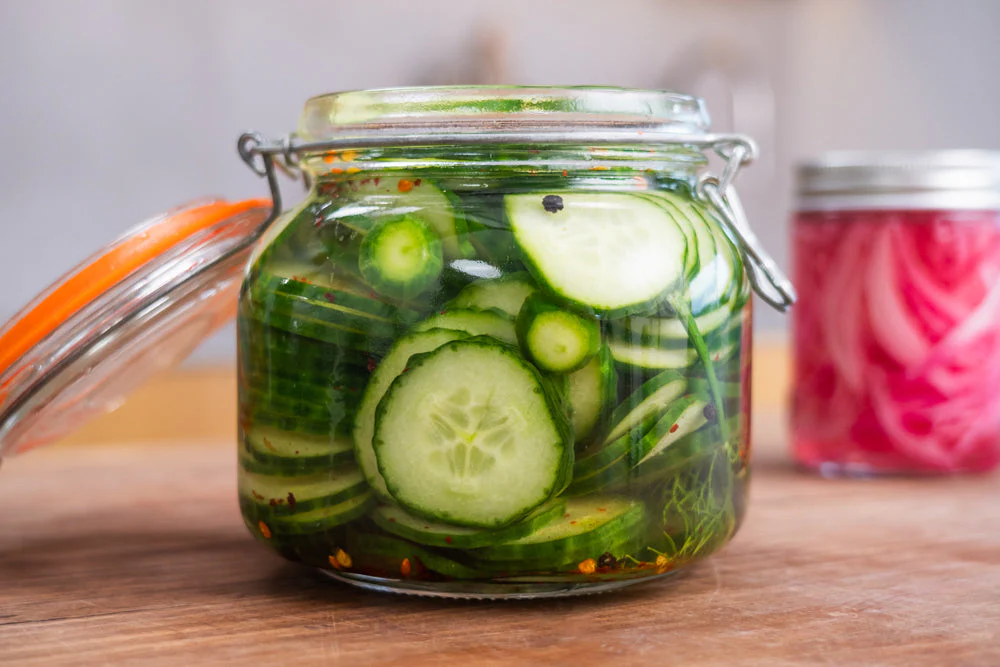
Precautions and Best Practices
While cucumbers are generally safe, a few notes apply:
- People taking blood-thinning medications should be mindful of vitamin K intake and consult a doctor before significantly increasing cucumber consumption.
- Cucumber skin may contain pesticide residues, so wash thoroughly or choose organic when possible.
- Cucumbers alone will not cure varicose veins but can complement a holistic lifestyle approach.
Conclusion
Common Questions, Quick Answers
Can cucumbers cure varicose veins?
No, but they may support circulation, reduce swelling, and strengthen vein health when part of a balanced diet.
How many cucumbers should I eat daily?
1–2 cucumbers per day, eaten raw, in smoothies, or infused water, is a simple and safe guideline.
Can cucumbers replace medical treatment?
No, they can only complement healthy habits. Consult a healthcare provider for treatment options.
Do cucumbers work better raw or cooked?
Raw cucumbers retain the most vitamin C and antioxidants, but they can also be lightly cooked or blended.
Cucumbers may be small and simple, but they carry powerful benefits for women and men struggling with varicose veins. By adding them to your meals, drinks, and daily wellness routine, you can support healthier circulation, reduce swelling, and promote stronger vein walls over time. This article is for informational purposes only and does not replace professional medical advice.




